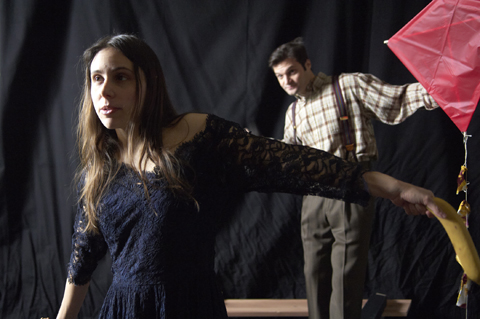
FINDING THE UNSEEN Portland Stage produces four lesser-known Williams works. |
A young boy walks the railroad tracks with a delusional girl who lives alone in an old house. A poet reunites with his mother at the bottom of the sea. A wealthy, restless sorority girl is drawn to a working-class writer. And an elderly woman living with relatives who have come to despise her presence. These are the plots of works by a playwright most known for Laura Wingfield's glass creatures and Stanley Kowalski's mournful "Stella!" But that playwright, Tennessee Williams, created a large body of works that aren't often produced, and to celebrate his hundredth birthday, Portland Stage Company is staging a lyrical, beautifully produced pastiche of four of them. Sally Wood directs an ensemble of four actors in this world-premiere gathering of short plays, entitled Hidden Tennessee.
Audiences enter the theater to a projection of Williams's complete, intimidatingly long bibliography on the back stage wall, and shortly after the lights go down, we hear recited excerpts from his famously poetic stage directions, and see his words typed out in projection. This overture lovingly conjures both the span and texture of his life and work, before the cast gathers to speak ensemble-style of Williams's publications, awards, first use of the name "Tennessee," and other watershed moments in his career. These biographical interludes form the connective tissue between the four short plays of the show.
All four works have appeared on stage — three were originally written as one-acts, and one as a short story — but never in this particular theatrical constellation. Act one begins with This Property Is Condemned (which became a 1966 film with Robert Redford and Natalie Wood), in which a young boy, Tom (Justin Adams), gains a troubling glimpse into the poverty and illusions of a young orphan, Willie (the marvelously gamine Sarah Lord). The next one-act, Steps Must Be Gentle, channels Williams's own struggles with an overbearing mother, who did not approve of his work or homosexuality, into the very similar circumstances of American poet Hart Crane (Adams). In this experimental piece, published in 1980, only three years before Williams's death, Crane (who jumped off a steamship and died at the age of 32) reunites with his mother (Maureen Butler) at the bottom of a blue and diaphanous sea (Anita Stewart's set design is once again evocative).
Act two opens with an enactment of the short story The Field of Blue Children. Beautiful, rich Myra (a radiant Courtney Moors) is of a social stratum that doesn't generally mix with folks like Homer (Adams), who is working to put himself through college, and whose hands she watches intently crimping the pages of books. Their coming together rouses the transcendent emotionality of that age, manifested in a gorgeous climax when Homer leads Myra through the night to a field of blue flowers. Finally, the last piece of the show addresses the uneasy failures and insecurities of old age, when Aunt Rose (Butler, with wrenchingly sensitive pathos) has outstayed her welcome in rural Mississippi with her niece (Moors, who is sensual and nuanced, fluctuating between cruelty and guilt) and nephew-in-law (Adams).